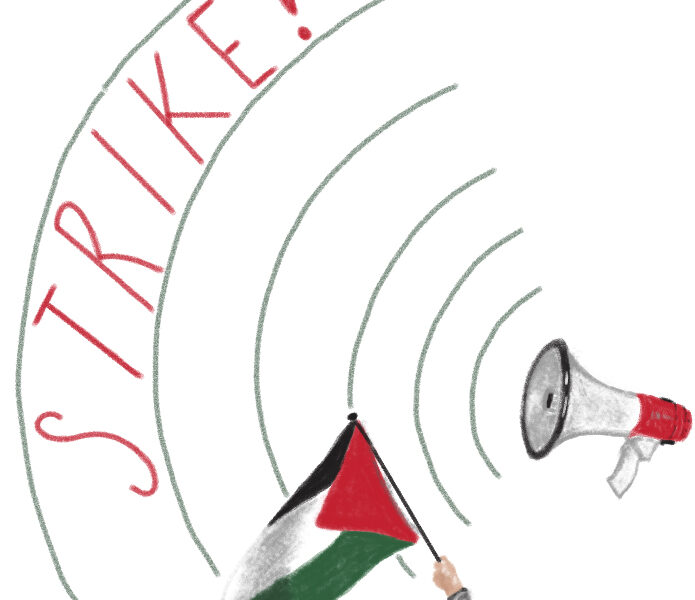This past week’s coordinated departmental strikes have raised a multitude of questions, concerns, criticisms, and misinformation. To clarify the purposes and intentions of these strikes, The Tribune has gathered five questions circulating on social media to answer, all relevant to understanding student activism on a deeper level.
Why are students striking as opposed to donating, fundraising, or participating in sponsorships?
Donations, fundraisers, and sponsorship may support specific initiatives, including aid, but they do not directly challenge the policies or investments of McGill as an institution. A strike, by contrast, is a direct call to challenge and holds McGill accountable for its entanglement with violence and genocide rather than applying a temporary band-aid to those issues. Where donations and sponsorship largely operate within existing frameworks, strikes have the capacity to demand systemic change.
What is the actual goal that the strikers hope to achieve?
As listed in the departmental strike motions, students choosing to strike are calling on McGill to divest from weapons manufacturers profiting from destruction and genocide in Gaza, to disclose the full amount of its financial holdings, to drop disciplinary charges against students engaged in activism, and to terminate its exchange and research programs with Israeli institutions that promote military technology used in the ethnic cleansing of Palestinians. However, student strikes such as these are also intended to be symbolic; the coordinated departmental strikes signify that the McGill administration cannot simply outwait student activism until it dies out or dwindles down. The need for change is not just concentrated in a few departments but is a widespread conviction among many students across both campuses. That strikes are happening in departments from Philosophy to Atmospheric Science signal that McGill students want the administration to take hold of their demands, irrespective of their course of study. While there are certainly larger demands for the strikes, another goal is to reinforce that student activism is not a trend, nor is it frivolous.
If strikers are so against McGill’s investment, why don’t they just transfer schools?
McGill, as a public educational institution, exists to serve its student body, and as tens of thousands of tuition-paying members, we have the privilege, power, and responsibility to push for ethical change from within. In 2022 alone, other Canadian universities such as Concordia and the University of Toronto achieved five major Boycott, Divestment, and Sanctions (BDS) victories. Rather than fleeing to institutions that have already begun to adopt desired outcomes, we can leverage our collective voice to influence McGill’s policies—and, in doing so, continue to set a standard for other universities to follow. The real question isn’t why we stay—it’s why McGill continues to fail to uphold the ethical standards it claims to value, and what we’re willing to do to force the administration to honour them.
Are the strikers really demanding amnesty from criminal offences: Vandalism, harassment, violence against those not participating?
One of the strike demands is for McGill to drop disciplinary charges against students involved in political demonstrations and advocacy. In April 2025, McGill filed an injunction that threatened disciplinary action against students who choose to participate in //peaceful// demonstrations. Likewise, McGill’s heightened security presence, including the hiring of an external private security firm, has served to create an atmosphere of violence against students exercising their right to free speech. The strike’s demands are not for McGill to allow people to break windows, incite violence, or intimidate those who choose not to participate. They are for McGill to recognize the right to protest and cease its disproportionately aggressive countermeasures, which, in the past, have included violent actions such as the employment of tear gas.
Is the strike intended to antagonize students who opt to go to class?
Students who continue attending classes are not the target of the action, but one goal of the strikes is to bring more saliency on campus to those who have chosen to look away from crimes against humanity. The strike seeks to draw attention to policies and investments that affect the entire community. By striking, departments create leverage that encourages McGill to act ethically and responsibly, which ultimately benefits all students. Rather than a personal attack, the strike is a form of collective advocacy that ensures student voices are heard in shaping the policies of the institution that we trust to serve our interests. In Gaza, 4 of the 16 university campuses have been destroyed, and 10 have been moderately to severely damaged. While we must acknowledge the importance of education, it is ultimately a privilege, and our learning cannot continue as normal when the livelihoods—and education—of other students around the world are so vulnerable. Meaningful change requires disruption—and if a temporary interruption to our routine is what it takes to compel McGill to act in the face of atrocity, that discomfort is nothing compared to what students and communities in Gaza have been forced to endure.









